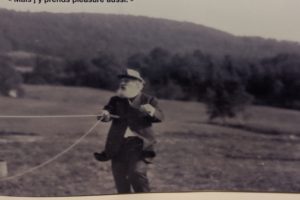At the Cotton Museum, we were given some handouts that included cotton details that we (and probably you) didn’t know. Often these handouts are for classes that come through the museum and for home schooling students. A dad and mom were there with their 4 kids the day we visited.
First, 1 bale of cotton equals:
- 21,960 handkerchiefs
- 4321 mid-calf socks
- 2419 jockey shorts
- 3000 diapers
- 1200 men’s t-shirts
- 1200 pillowcases
- 875 blouses
- 750 terry bath towels
- 750 dress shirts
- 350 dresses
- 300 jeans
- 200 sheets
Here are some more facts:
- Cotton was first woven into cloth more than 5000 years ago.
- Cotton provided the insulation for the telegraph invented by Samuel Morse.
- The Wright Brothers used cotton muslin to cover the wings of their first plane.
- Cotton provided the magic cord for tires that put America on wheels.
And here’s an interesting timeline:
- 1492 – Columbus discovers cotton growing in Bahamas
- 1607 – Colonists plant cotton in Virginia
- 1712 – English Parliament prohibits wearing of cotton or use of cotton goods
- 1736- Parliament gives up and lets folks wear cotton (spurring rapid growth of textile industry)
- 1769 – Richard Arkwright patents the roller spinning method and becomes the father of the modern textile industry
- 1793 – Eli Whitney invents the gin
- 1861 to 1865 – During the Civil War, cotton production falls to 4% of pre-war output
- 1875 – Invention of first machine for stripping cotton
- 1892 – Boll weevil crosses the border from Mexico
- 1916 – Calcium arsenate is used commercially for controlling the boll weevil and other cotton insects
- 1926 – Highest ever 1-year level of exports: 11,299.000 bales
- 1927 – John Rust announces moistened-spindle method of mechanical harvesting
- 1937 – Highest single year production: 18,946,000 bales (from 33.5 million harvested acres)
- 1938 – First application of a defoliant
- 1946 – First commercial use or organic insecticides
- 1955 – Chemical weed control is first used
- 1973 – Price of cotton hits $1 a pound
I feel so much smarter now; how about you?





Leave a Reply
Your email is safe with us.